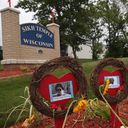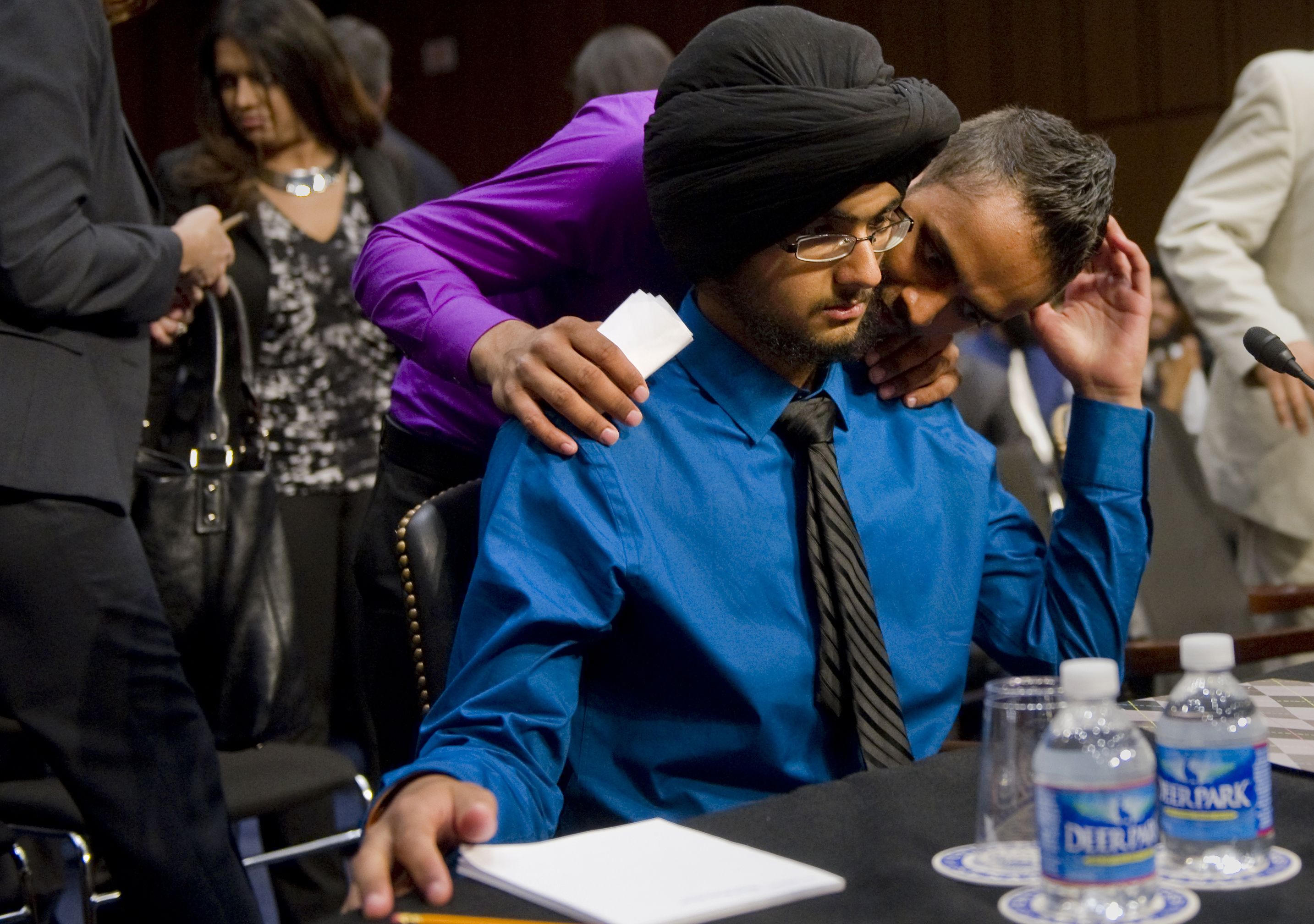10 years later, Sikhs say the hate that drove Oak Creek shooting is now mainstream

Ten years ago, a white supremacist opened fire in the Sikh Temple of Wisconsin in suburban Milwaukee. Friday marks a decade since the gunman killed six people and wounded several others, one of whom would die from his injuries in 2020.
The big picture: Experts and family members of the victims say the white supremacist ideologies that motivated the 2012 attack have now gone mainstream.
Zoom in: On Aug. 5, 2012, 18-year-old Harpreet Singh Saini's mother woke him up to accompany her to the Sikh temple in Oak Creek, Wisconsin. He was too tired, he told Axios, so Paramjit Kaur Saini ultimately left for the gurdwara alone.
- Less than half an hour later, his aunt called — a shooter had entered the house of worship.
- Pardeep Singh Kaleka, whose father founded and led the gurdwara, knew immediately that his parents were in the crosshairs. He told Axios he later learned his father, Satwant Singh Kaleka, had fought the gunman off with a butter knife and suffered five shots at close range.
Saini's mother and Kaleka's father both died that day. "There were feelings of shock that something like this could happen in a place of worship," Kaleka said. "That day led to weeks and months after just trying to pick up the pieces."
- The shooter, an Army veteran with ties to white supremacist and neo-Nazi groups, had led a white power band called End Apathy.
- "He represented white supremacy at its core," Kaleka said. "And here we were, a small minority community that America knew really little about."
State of play: Members of the Sikh community became targets in the post-9/11 landscape, often mistaken for Muslims and vilified as terrorists.
- Sikh Americans across the country had been urging the federal government to start tracking anti-Sikh hate crimes, said Sim J. Singh, the Sikh Coalition's senior policy and advocacy manager.
- Just weeks after the shooting, Saini testified before the Senate Judiciary Committee, asking lawmakers to "give my mother the dignity of being a statistic." In 2015, the FBI officially began documenting anti-Sikh hate.
- The agency's 2020 report on hate crimes and bias showed that anti-Sikh incidents were at their highest level since the FBI first began tracking them — Sikhs were the third most targeted faith community in the U.S.

Since the Oak Creek shooting, white supremacist ideologies have widened their reach across America, driving the Great Replacement Theory, new extremist groups and several more hate-motivated mass shootings, according to Michael Lieberman, senior policy counsel at the Southern Poverty Law Center (SPLC).
- "In the last year, the FBI, DHS ... the White House, Justice Department, everybody recognizes that the principal threats now are white supremacists and anti-government militia groups," Lieberman told Axios.
- An April poll conducted by SPLC and Tulchin Research found that over a third of Americans feel the country’s changing demographics are a threat to white Americans and their culture and values.
What they're saying: The U.S. needs a "whole-of-society" response, Kaleka said, pointing to the lack of a robust mental health care infrastructure, inadequate education on Sikh American communities and deeply rooted toxic masculinity. Many Sikhs have also called on the federal government to mandate hate crime reporting, which remains voluntary.
- The Jabara-Heyer NO HATE Act, which established grants for states to create hate crimes reporting hotlines, came as a win but there still hasn't been "enough movement" to address challenges in hate crime data collection, Singh said.
- The Sikh Coalition has been pushing for Congress to move forward with three pieces of legislation, including the Domestic Terrorism Prevention Act, which aims to create better federal standards for investigating white nationalist and supremacist groups. (The bill cleared the House but didn't pass the Senate.)
The big picture: Today, the Sikh Temple of Wisconsin is fortified with security cameras. No one can enter unless the stationed security guard or a priest lets them in.
- The community has planned several events to mark the 10-year anniversary, including a vigil, workshops on threat assessment and interfaith gatherings.
- The Sikh Coalition will also be holding its annual National Day of Seva, which started in 2013 to honor the lives lost. Sikhs and non-Sikhs alike are invited to participate in community service events across the country.
"There was a lot of anger in the immediate aftermath ... but it's a fuel that's exhausted very quickly," Kaleka said.
- What fuels them now is compassion, he said, pointing to tenets of their faith — love and inclusion, mission and purpose.
- His father lived those values, Kaleka said. "At any point he could have abandoned his place of worship. The exit door was 10 feet away. But he had something that was worth fighting for."
- "To many Sikhs ... there's no greater sacrifice or what we call martyrdom — shaheedi — than to die in the place that you helped build. The people that you helped build it for. And that can't be taken away from him by any government or white supremacist."